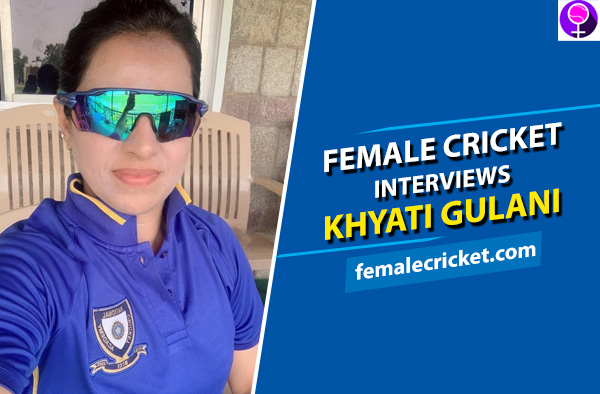She played cricket for Delhi for 10 years and immediately after calling it quits from playing dived into coaching. With a diploma from NIS, followed by BCCI level 1 and Cricket Australia level 2 certifications, she is an established name in the cricketing circle. First Delhi, then Nagaland, and now with Chandigarh, she has been a coach for 12 years. The cherry on top for her has of course been working with the FairBreak team which had 11 players from 11 different countries.
We are talking about Khyati Gulani. Female Cricket got in touch with this young but massively experienced coach from Delhi, to know more about her exciting journey.

Excerpts from the interview
How are you keeping yourself busy during the lockdown?
This lockdown induced break has been a blessing in disguise for me. I am making good use of this free time to update my knowledge. I have been reading a lot of books as well. Apart from this, I am conducting online sessions for my trainees spread across the world. It feels good to reconnect with them. I am also doing live sessions on Zoom, Instagram, etc.
Take us through your early days in cricket.
Just like any other girl in the country, I started playing cricket in my own neighborhood. Right throughout my childhood, my parents were very supportive. They did not discourage me from playing with the boys, despite the society influencing them to do the otherwise. From a very early age, I was attracted to bat and ball, and I simply loved playing cricket. Fortunately, the school in which I was studying had a girls’ cricket team. I was a part of the team. Gradually, I made my way into the Delhi U-16 team in 1995. I played for the state till 2006. For some reason, I bid adieu to the game I loved playing the most and decided to start a new inning.
Can you share with us any incidents that you recall from your domestic days?
I played for Delhi for over 10 years. I played alongside Anjum Chopra, Reema Malhotra, Amita Sharma, Rajni Sharma, Dipti Dhyani, to name a few, and learned a lot from them. I used to try to emulate some of their styles, and one fine day, when my coach saw me doing that, he asked me to be original. I was a good fielder and usually fielded at the point. While batting I loved playing the cuts.
During one of the matches that we were playing somewhere in Bihar, I vividly remember, stitching a record-breaking partnership of 240 runs with Vandana Gupta. That was one of my finest innings. When I was on my way back to the pavilion, a man from the crowd jumped on to the ground and was standing right in front of me. I was left speechless and did not know how to react. In the hindsight, it was a funny incident (smiles).
How did you get into cricket coaching?
I hung up my boots from playing cricket in 2006. My parents were of the opinion that I should try something else other than cricket. I enrolled myself in an aviation course. Honestly, I did not attend it even for a single day. I could not imagine myself doing anything but cricket. I consulted my sports teachers and coaches. They told me that I should get into cricket coaching. I thought that it was a good idea. I completed the NIS diploma in cricket coaching and then BCCI level 1. I also pursued sports management and worked as an operations head (North Zone) with Anil Kumble’s Tenvic Sports. Later I got a chance to be a part of Sonnet Cricket Club after Tarak Sinha sir called me to take up coaching assignments there.
Now that you have certifications from NIS, BCCI, and Cricket Australia, can you tell us, how is each of them different?
NIS has several courses that cover sports science, nutrition, preparing pitches, inter alia. If you want to do a specific course from NIS, then there are six-week specialized courses. However, just completing the NIS course is not enough these days. You need to have something extra. It is always better to compliment NIS courses with BCCI level 1 coaching exams. In addition, if you want to learn some more, then there is no harm in doing so. To get a different experience, I did my level 2 from Cricket Australia. As far as the knowledge imparted by BCCI and Cricket Australia is concerned it is as different as chalk and cheese. For instance, in India, we tend to focus more on skills, while in Australia; the emphasis is more on strength and mental conditioning.
Take us through your coaching journey.
After clearing the required exams, I got a call from DDCA to be the coach of the Delhi state team. This was in 2008. For 10 years, that is till 2017 I was the coach. Then in 2018, I was given the opportunity to coach Nagaland. Last year I was with Chandigarh. There are a lot of differences in challenges that you encounter while you are coaching an established cricket team like Delhi viz-a-viz a new team like Nagaland.
For instance, in Delhi, you have the state of the art infrastructure, but with it come expectations to deliver the best. In Nagaland, you do not have the best of the facilities, but you get a chance to work with the upcoming talent. The main challenge there was converting the players from soccer to cricket. Chandigarh was again a different experience. Working together as a team composed of junior and senior players was interesting. Our effort paid off when we won nine matches on the trot in the plate group last year.
How was your experience in Nagaland?
It was quite challenging in the beginning. When the team secretary introduced me as the coach to the team, I think the girls were not that happy, probably because, they didn’t want a north Indian to come and coach them. I was also out of my comfort zone. There were cultural differences and language barriers.
However, we overcame the same gradually. As a team, Nagaland has a lot of potentials. The players are very athletic, powerful, and they have the hunger to show the world that they exist. I was happy that five to six girls from Nagaland made it to the northeast camp. I believe that they have it in them to make it big in a matter of a few years.
What are some of the things that you should follow while coaching?
Since cricket is a team game, it is important to coach each and every player in the team. You cannot ignore anybody, because, even a single individual can affect the outcome of the game. It is also important to understand that one size doesn’t fit all. This means that you cannot have the same set of programs, training, exercises, etc. for each and every player. Apart from this, it is essential that you address the problems of the players, work with them on the same, and ultimately bring out the best in them. Also, you need to acknowledge the concept of correctors.
For instance, if you have a good fielder, who is an average batter, and you have just a short span of time with him/her before the tournament, then you must work on his/her strength that is fielding rather than improving his/her relatively weaker area that is batting. Cricket is a game that is 30 percent skill-based and 70 percent mind-based. Therefore it is crucial that the mental conditioning of the players is done. As a part of mental strengthening, I stress on breathing exercises, visualization, etc.
What are some of the qualities that a cricketer should have to make it big in the sport?
Commitment, dedication, consistency, and of course discipline.
Since you are a voracious reader, which books would you recommend to players/coaches?
‘Art and Science of Cricket’ written by Bob Woolmer is a must-read for all the cricket coaches as well as for the people who are aspiring to get into coaching. Apart from this, biographies are good reads, as it helps the reader to understand the journey of cricketers. You get to learn from their experiences. For instance, Geoffrey Boycott’s and Sourav Ganguly’s books are very inspiring.
How to handle stardom, which is one of the biggest challenges that the cricketers face today with immense exposure via social media?
There is a lot to learn from men cricketers like Sachin Tendulkar, Virat Kohli, MS Dhoni, etc. who have shown time and again that they are seldom affected by the stardom that they have earned because of cricket. You have to just go out there and play fearless cricket. Don’t worry about who is watching you but at the same time be responsible that you might be someone’s role model. Carry yourself with dignity and poise. And, I think having a mentor, who will keep you grounded, is very essential. He/she can guide you as well. I am lucky to have a mentor in Arun Bharadwaj sir.
Has spirituality played an important role in your rise as a cricket coach?
Yes, definitely. I believe that the way we provide food for our body, we have to give food to our soul, which is nothing but spirituality. I feel that when we get busy in our lives, we simply forget to provide this food for our soul. In my life, spirituality plays a pivotal role. I visit the temple daily. It is a place where I can connect with myself.
What does it take to be a good coach?
A coach should be a good man-manager and always strive to empower the players. He/she should constantly update his/her knowledge and keep on learning from players and other resources. Always remember, that there is no full stop to learning. Moreover, having a set routine and a list of goals to be achieved is crucial.
How do you motivate the players?
I try to make practice sessions more interesting and enjoyable by throwing up challenges at the players. I also have match simulations, in which, the batters are required to score runs off stipulated overs or the bowlers are asked to defend a particular target. Moreover, rewarding the players in kind also motivates them to put in that extra effort.
What is your ultimate goal?
I want to coach the Indian team in the future.

I am a former cricketer having represented Mumbai University at All India University level. I was a part of MCA probables for the U-19 and U-23 age group. I have been an avid cricket writer for the last five years. Currently I am pursuing my Ph.D from IIT Bombay.